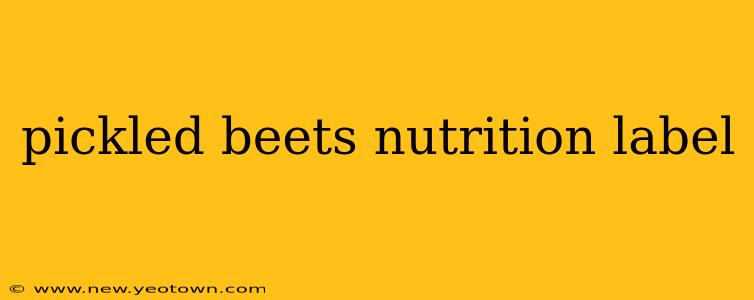Pickled beets. The vibrant crimson hue alone is enough to draw the eye, but beyond the striking color lies a surprisingly nutritious vegetable often relegated to the side of a plate, or worse, forgotten altogether. Let's delve into the world of pickled beets, exploring their nutritional profile and addressing some common questions.
My journey into the world of pickled beets began, oddly enough, with a quest for a vibrant, healthy addition to my salads. I'd always seen them, lurking quietly in jars at the grocery store, but never really gave them a second thought. Once I started incorporating them into my meals, I was amazed by their flavor and the surprising health benefits they offered.
What are the Nutritional Benefits of Pickled Beets?
Pickled beets, while processed, still retain a significant amount of the nutrients found in fresh beets. They are a good source of several essential vitamins and minerals. These include:
- Fiber: Pickled beets contribute to your daily fiber intake, aiding in digestion and promoting gut health. That satisfying crunch? It's largely thanks to the fiber.
- Nitrates: Perhaps the most talked-about component of beets, nitrates are converted to nitric oxide in the body, helping to improve blood flow and potentially lowering blood pressure. This is one of the reasons beets have gained popularity as a health food.
- Antioxidants: Beets are rich in antioxidants, which help protect your cells from damage caused by free radicals. These antioxidants contribute to overall health and well-being.
- Folate: An essential B vitamin crucial for cell growth and development, especially important during pregnancy.
- Potassium: An electrolyte vital for maintaining healthy blood pressure and fluid balance.
- Manganese: A mineral that plays a role in bone health, wound healing, and metabolism.
How Many Calories are in Pickled Beets?
The calorie count in pickled beets varies depending on the brand and preparation method. However, a typical serving (about ½ cup) generally contains around 40-50 calories. This makes them a relatively low-calorie, nutrient-dense food option.
Are Pickled Beets Good for Weight Loss?
Because of their low calorie and high fiber content, pickled beets can be a helpful addition to a weight-loss diet. The fiber helps you feel full, reducing overall calorie intake. However, it's crucial to remember that weight loss is a multifaceted process that involves a balanced diet and regular exercise. Don't rely solely on pickled beets for weight loss.
Are Pickled Beets Healthy?
While the pickling process does reduce some nutrient content compared to fresh beets, pickled beets still offer a significant amount of vitamins, minerals, and beneficial compounds. The added sodium from the pickling brine is a point to be mindful of, however, especially for individuals with high blood pressure. Moderation is key.
What are the Potential Downsides of Eating Pickled Beets?
The primary downside is the high sodium content. Excessive sodium intake can contribute to high blood pressure and other health problems. Therefore, it’s wise to consume pickled beets in moderation and consider low-sodium options when available. Additionally, some individuals might experience digestive discomfort due to the high fiber content, especially if they aren’t used to eating high-fiber foods. Always listen to your body.
Can I Eat Pickled Beets Every Day?
While pickled beets offer various health benefits, it's not recommended to eat them every day due to their high sodium content. Incorporate them into your diet as part of a balanced and varied eating plan. Variety is the spice of life, and nutrition too!
My personal experience with incorporating pickled beets into my diet has been incredibly positive. From adding a colorful crunch to salads to using them as a flavorful topping for roasted vegetables, they've become a staple in my kitchen. They’re a reminder that even seemingly simple ingredients can offer surprising health benefits. Give them a try and see for yourself!

